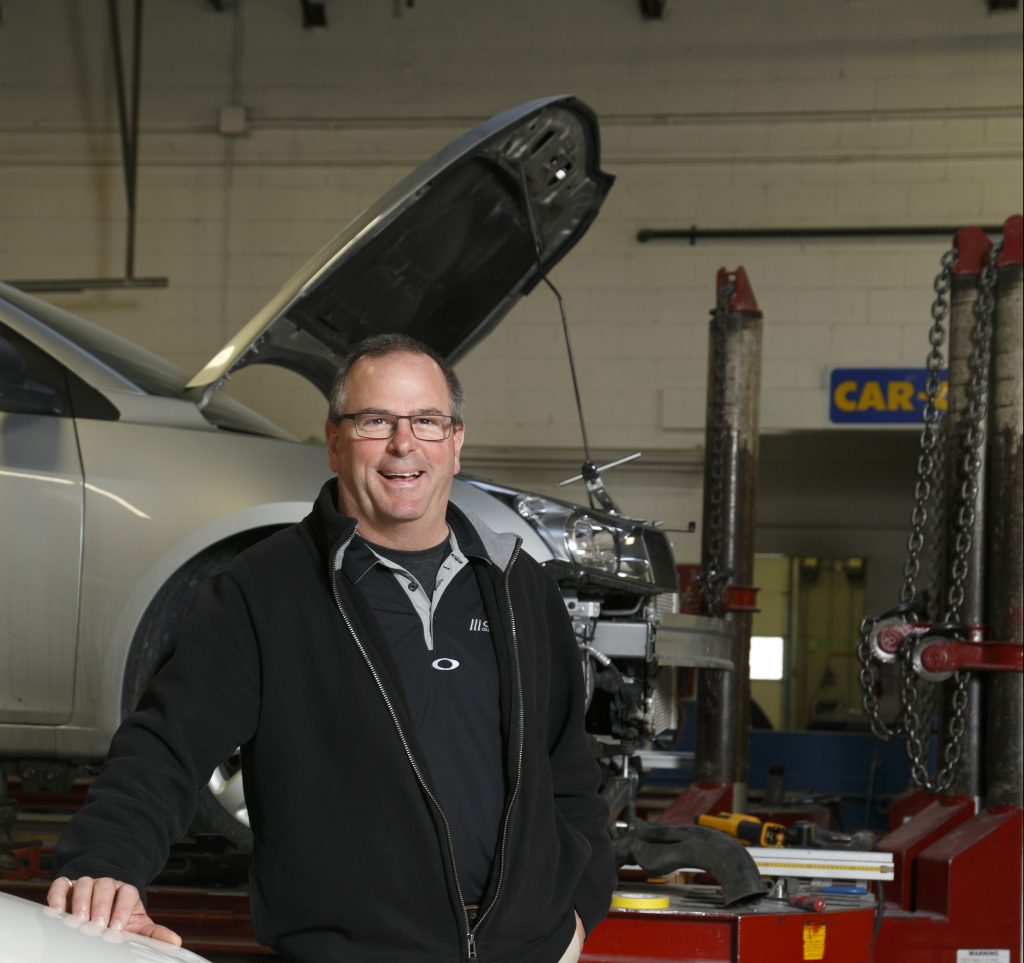Long-term Fix
In the face of growing competition from consolidators and independent shops alike, a family-run auto collision shop finds old-school values still reign supreme
Photo: Jeff Jones, president of Jones’ Auto Body
IT HAPPENS OFTEN, says Jeff Jones, president of Jones’ Auto Body.
“People enter our facilities and say, ‘Is this a body shop? Wow!’”
While many people have a perception that auto body shops are dirty and dusty businesses, the reality is quite different, says Jones. “Today’s successful collision facilities are clean, well-organized and environmentally focused, with highly trained staff and customer service areas that are comfortable and very inviting.”
Celebrating its 50th anniversary this year, Jones attributes the success of the shop to being a local, family-owned business that makes a concerted effort to stay connected to its community, customers and employees. Most of its staff are long-term employees, or new employees intending to be long-term. Owned by Jeff, wife Lee Ann and sons Dillon and Colton, Jones Auto Body (jonesautobody.com) was launched by Jeff’s parents, Terry and Barbara Jones, in a small shop on Third Street in 1967.
“Handheld devices, as well as the complexity of the vehicle dash
configuration, contribute to most collisions today” —Jeff Jones
“My parents were passionate about automotive collision repair,” says Jones. “They had no formal business training, just a passion for cars and the understanding that a happy customer is the best asset.”
In 1980s, Terry and Barbara acquired neighbouring properties, and by 1987 they had expanded their modest shop to its current 25,000-square-foot size. In 1999, Jeff purchased the business from his parents. Then, in 2014, Jeff and family opened a second facility on Mallard Road, allowing Jones’ Auto Body to better serve the growing market in the city’s west and north ends.
Today, there are 28 employees providing complete in-house collision repair and refinish, including air conditioning, tires, suspension, alignments and computer diagnostics services. The core business is collision repair for insurance claims, which accounts for approximately 70 per cent of business. The remaining 30 per cent is derived primarily from car dealerships.
Over the past four years, Jones says overall sales have doubled—attributable to expansion of the business itself, and a healthy flow of clientele. These days, the most common repairs are front and rear impacts due to distracted driving. “Handheld devices, as well as the complexity of the vehicle dash configuration, contribute to most collisions today,” observes Jones.
The recipient of numerous consumer and industry awards, Jones’ Auto Body has received Consumer Choice and Best of London accolades for the past five years running, as well as best-in-class awards from CSN (Collision Centres Network). In 2015, the business was awarded the National Sales Growth Award for shops within the CSN, as well as the network’s Shop of the Year award.
Jones’ Auto Body became a member of the CSN in 2003. Comprised of over 320 locally owned auto repair shops in Canada, the member shops are preferred repair centres for a number of insurance companies, and all of the work by member shops is backed by a national lifetime warranty.
According to Jones, the decision to become a member of CSN has delivered a number of operational advantages. “It’s helped us in sustaining and growing our business. It’s provided us with national exposure as well as crucial insight into changes and trends within our industry, as well as sharing best practices with top shops across the country and accessing training courses. Most top-performing shops in the CSN Network are working towards or have completed manufacture certifications. We’re currently finishing our certifications for Honda and Toyota.”
The network also delivers a number of administrative benefits, says Jones. It provides central billing and single-point management for shops in the network, enabling insurance companies to manage the entire network of shops by communicating with the CSN head office. As well, member shops can access a third-party consumer satisfaction index, net promoter score reporting and a central call centre.
For all of its success, however, Jones says the business grapples with challenges that are common to the broader collision repair industry. “It’s increasingly difficult to attract individuals to the trade,” he notes. “Since the 1990s, the industry has experienced a decline in the number of trade school enrolments. That and the aging workforce have reduced the number of skilled tradespeople available to be employed in the industry.”
To enter the automotive repair trade, applicants must have grade 12 or equivalent as mandated by the province, and once accepted, the applicant must complete a four-year apprenticeship program. “We’re fortunate to have a good relationship with the Fanshawe College automotive department and apprenticeship program,” says Jones.
“Students that are either participating in their programs or are interested in the trades are directed to us by Fanshawe for work placement opportunities. We are always open to apprenticeship opportunities.”
In addition, with most top-performing auto body shops working toward or having completed manufacturer certifications, Jones says differentiating a business in the collision industry today has become increasingly based on client satisfaction. But that’s not a bad thing, he stresses. While technology and operational structures play a much bigger role in the day-to-day running of an auto body shop now, passion for the profession and a dedication to customer service remain paramount—just as it was for Terry and Barbara Jones in 1967.
“The ease of doing business with the customer, how the shop reacts and contains complaints and how we stand behind what we do and say—this is where the differences lay.”
“The ease of doing business with the customer, how the shop reacts and contains complaints and how we stand behind what we do and say—this is where the differences lay.” ![]() Christine Dirks
Christine Dirks

